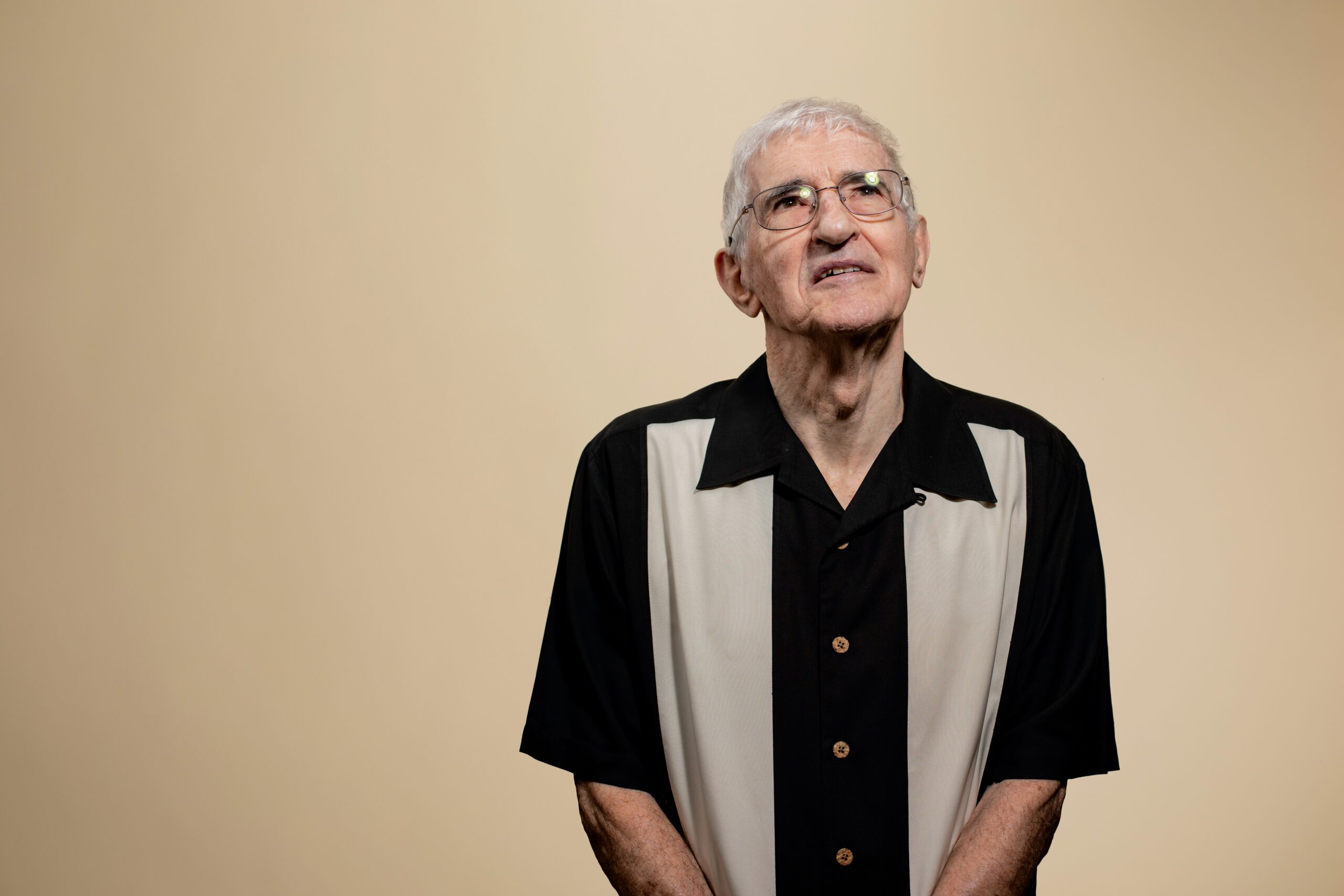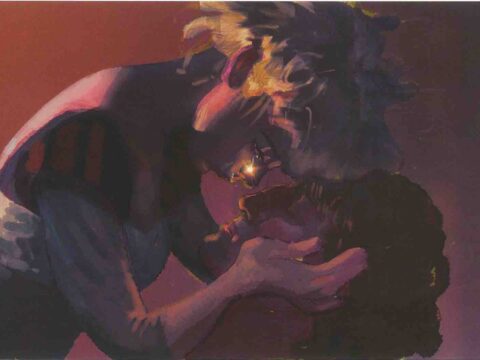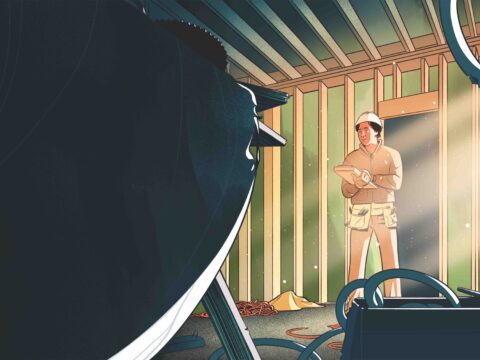John Dominic Crossan is widely regarded as one of the foremost historical Jesus scholars of our time. He was an influential member of the Jesus Seminar, a group founded to examine the historicity of the deeds and sayings of Jesus and to report the results of its research to the general public. Crossan’s new book is “Resurrecting Easter: How the West Lost and the East Kept the Original Easter Vision.” Crossan spoke with Alicia von Stamwitz.
Alicia von Stamwitz: Why did you start researching the resurrection?
You may unsubscribe from any of our newsletters at any time.
John Dominic Crossan: From the year 2000 on, I was helping lead people around Turkey to study Paul. But in the process of going through churches in places like Cappadocia and Istanbul each year, [my wife, Sarah, and I] began to notice these weird images of the resurrection. Remember that the actual event of the resurrection is not described anywhere in the New Testament. Artists had to figure out how to portray the resurrection without any text to guide them.
In the West, we have Jesus coming out of the tomb, alone, looking a bit like an athlete coming out well buffed from the gym. But in the East, you have Jesus holding the hand of Adam and Eve and leading them out of Hades. We could see it everywhere we went in Turkey, and we were curious. We started visiting churches in Egypt, Russia and Romania and realized that this is the normal resurrection image for all of Eastern Christianity.
AVS: What did the two portrayals tell you?
JDC: The Eastern churches have a universal vision of Jesus arising with all of humanity, symbolized by Adam and Eve. Western Christianity has a more individualistic vision of Jesus, arising glorious and triumphant but also solitary and alone.
In the Eastern vision, all of humanity is inside the story. I’m participating in the story. It’s not outside of me; it’s not like somebody is doing it for me. We in the West have far too much substitution. We think it’s going to be done for us or already has been done for us. And that gives us nothing to do. You just have to believe enough weird stuff to get to heaven.
More on Broadview: Unravelling the myth of Mary Magdalene
AVS: You approach your research from a strictly historical perspective. How does that affect your faith?
JDC: It has strengthened my faith and made it far more viable. If you have faith but don’t have the historical background, you really have superstition.
If you are happy with a rather traditional don’t-ask-questions type of faith, my research is going to bother you the same way that a two-year-old will be bothered if you tell him there’s no Santa Claus. But at a certain point kids grow up, and at a certain point adults should grow up with their religion, too. What faith means for me is always asking questions. Borrowing from Socrates, I’d say the unexamined faith is probably superstition.
AVS: That reminds me of your work with the Jesus Seminar. Can you tell us about that?
JDC: Bob Funk founded it in 1985 and asked me to be co-chair. He said it’s good that we scholars have all these discussions about the historical Jesus in our scholarly magazines and conferences, but let’s do our work out in the public. We saw it as an ethical necessity that interested lay people should know what scholars were saying so they’d be educated — not indoctrinated — and make their own decisions.
AVS: Can you give us an example of one of those discussions?
JDC: There was a massive consensus in scholarship that of the materials attributed to Jesus in the four Gospels, some came from Jesus, some came from the tradition about Jesus, and some came from the evangelists. But Matthew, Mark, Luke and John always put the words on the lips of Jesus. That’s the way they did it back then. So when John writes, “Jesus said” followed by a big long speech — well, no. Jesus probably did not say that.
AVS: In addition to Jesus’ words, you emphasize that we should pay attention to what Jesus does and doesn’t do.
JDC: Yes. The writers of the Gospels are completely convinced that Jesus can do whatever he wants to do, but you don’t see him lifting the Pharisees five feet in the air and dropping them on their heads. So that’s how you know that when Matthew writes those nasty rebukes, “You brood of vipers and hypocrites! You’re going to hell!” what you’re really getting is Matthew’s exasperation.
AVS: Is there a core message about the historical Jesus that you’d like to get across?
JDC: Let me say the crucial one for me — and absolutely the most historical — is that Pilate is the most important witness to Jesus in the entire New Testament. Because the Roman method of dealing with a violent rebellion is to crucify the leader and his followers. For non-violent resistance, the Romans crucified only the leader. Nothing is said about Pilate rounding up and crucifying the apostles. So if I know only one thing, it’s that Jesus was crucified for non-violent resistance to Roman law and order. He is the only founder of a great religion that was actually so executed.
“Borrowing from Socrates, I’d say the unexamined faith is probably superstition.”
AVS: John the Baptist is another important witness. How did John influence Jesus’ ministry?
JDC: It’s really the most fascinating thing. We know that Jesus started out with John because he was baptized by him. John the Baptist said, “The kingdom of God is coming soon. Wait for God. Be ready for God. Prepare for God.” But then what actually came was Herod Antipas’s cavalry, and John was executed. God did nothing.
Now Jesus has a few choices. He can abandon the whole thing and go back to Nazareth. Or he can pick up the fallen banner of John the Baptist and say, “He just got the date wrong. The kingdom is still coming soon — but it’s coming next year.” Or he can say, “Wait a minute. We’ve been waiting for God to do this for 700 years, since Isaiah. Maybe the whole thing is wrong.” This is what I think Jesus said, in effect, “We’ve been waiting for God to do it for us, and God has been waiting for us to do it with God.”
AVS: Can you say more about that?
JDC: The kingdom of God is here, but only if you enter into it. Only if you take it upon you. It’s not like an empty building that’s there whether you or I are in it. It’s a community. The shift between John the Baptist and Jesus is summarized in that accusation that’s made about both of them by their enemies: that one fasts and the other feasts. I think that is right, because you fast in preparation for what’s coming, and you feast in celebration of what’s present.
AVS: And what’s your take on the Gospel’s accounts of miracles such as the healing power of Jesus?
JDC: Anthropologists make a distinction between curing and healing. A good illustration of this is the movie Philadelphia. The character played by Tom Hanks isn’t cured. We know he’s going to die. So why do we feel good at the end of that movie? We feel good because he was healed. He was healed because his partner, his family, his colleagues — they all supported him. There was a whole community around him.
What I see Jesus doing when he heals people is bringing them into a new community. He takes in people who may see themselves as a burden or an embarrassment and brings them in. That’s all. However it’s done, somehow in this new community they are not a liability or a shame. They belong. I think that’s what actually happened.
AVS: That’s a helpful distinction when I think about all the people I know who have not been cured despite their fervent prayers.
JDC: Yes. I went to Lourdes in France as a chaplain when I was a priest, and what I found extraordinary is that 40 sick people were brought there and told, “If your faith is strong enough, you’ll be cured.” Later, I would watch the same 40 people on the same stretchers get back on their planes. Nothing had changed. And I’m trying to figure out: why aren’t they crushed? Not only are they still as sick as they always were, but clearly their faith was “inadequate.” They should be doubly crushed. Instead, they seem to be feeling great.
All I can say is that the community at Lourdes is a community of the sick. If you’re sick, you’re at the centre. You have a place. You’re not the weirdo who doesn’t fit in.
AVS: How would you characterize religious practice today?
JDC: I watch quite carefully what we’re not talking about, and we’re talking an awful lot about spirituality at the moment and not a lot about religion.
I understand that, because so much of organized religion has betrayed itself. It really has. But the trouble is, so has organized politics. If there’s no organized politics, we all go our own way. It’s the lack of organization that makes you irrelevant, and that’s what I’m afraid of.
This interview has been edited and condensed for length and clarity. It was first published in Broadview’s March 2020 issue with the title “John Dominic Crossan.”
Broadview is an award-winning progressive Christian magazine, featuring stories about spirituality, justice and ethical living. For more of our content, subscribe to the magazine today.













What I got out of this article is that John doesn’t believe in the inerrant Word of God (the Bible). He also doesn’t believe Jesus was God. He doesn’t believe anything Jesus said – it was words put into His mouth. (So why bother professing a faith when you don’t believe anything)? He also does not believe in miracles (which makes sense, because it would give accreditation to Jesus being God).
Luke 16:19-31 (If you of course believe it was Jesus speaking) Gives us a clear idea of what happens when one died before Christ’s resurrection. It appears the Eastern Orthodox got it wrong as well, Adam and Eve would have been in Paradise, not Hades.
I’m not sure what he means “the actual event of the Resurrection is not described anywhere”. How does he account for the missing body? The actual event of Hitler killing himself is not described either, but evidence and witnesses has proven it a fact.
Please describe the “weird stuff” I believe. I’m thinking the weird thinker is John.
There has been plenty of writing which gives historical accuracy of the narrative, so it’s not based on superstition – John even uses Pontius Pilate as a reference. Pilate in the narrative didn’t think Jesus should have been crucified, he just gave in to political pressure to shut the religious Jews up, it had nothing to do with a rebellion. Why would you want to make the Gospel of Christ up?
John the Baptist said (paraphrased): Repent! or Prepare the way of the Lord. These are not words that reflect waiting. (Repent is a military word to do an about face – I dare a soldier to think “My commander doesn’t mean now”)
If I were John, I’d give thought to what is Spiritual and what is religion. One focuses on God, the other focuses on man.
If you think you are irrelevant, then I would challenge you to listen to what God has to say to you. God will make sure you make a difference with or without religion, and with or without a church organization.
Here’s Easter – a person who is FULLY God and FULLY man, died. On the third day of His death he defeated death by raising Himself up from death. Only God can defeat death as He Himself is life. It would do you well to consider this, and the purpose behind it.
I would add the following to your comment. The title of the article is deceptive. Crossan is never asked what he really thinks happened to Jesus. Historically both the western and eastern churches proclaim that Jesus of Nazareth was cruxified, died, was buried, and God raised him from he dead. He is not a metaphor or a butterfly. The magazines editorial position subtly suggests that Crossan represents the more sophisticated historical viewpoint of the theological intellectual who having examined the gospels will not conclude the resurrection is a historical event. That would be supersticious. The readers of this magazine who are not familiar with the academic criticism of the work of the Jesus seminar would not necessarily know there are many more contemporary NT historical scholars and scholarship, equal to Crossan’s qualifications and intellectual acumen. They would say it is quite ‘reasonable’ on the basis of the historical record that the witnesses to the risen Christ encountered him.
Ironic, it took 40 men (from kings to servants) over a span of 1500 years to write a coherent collection of books. This collection has served mankind well over the past 2000 years, and proven dependable (whether you want to believe it or not). Yet, in the past 35 years we have some 74 “intelligent” people who have little or no accreditation, using Urim and Thummim to “prove” it’s all a hoax.
The bottom line is that Jesus counseled us to love our enemies.
He said to give to those who beg of you.
He told us to pray to God “in secret.”
In Matthew 5:45 he said:
“The Father makes his sun to shine on the evil and the good and lets the rain fall on sthe righteous and the unrighteous.”
He told us “God desires mercy and not sacrifice.”
The ‘Great Commandment’ from Jesus was:
“Love the Lord your God with all your heart, with all your soul, and with all your mind. This is the greatest and most important commandment. The second is like it: Love your neighbor as yourself. All the Law and the Prophets depend on these two commandments”
He either preached these things or he did not.
We can’t have it both ways.
Believers should start studying the parables and following Jesus, not putting a Christ on as pesdestal and worshiping an icon. Look to Jesus of Nazareth who was an iconoclast [smasher of icons]. The definitive disclosure of the divine on earth. The one who practiced radical hospitality.
We are here to help establish the Kingdom of God on earth.
What would the world today look like if God sat on the throne instead of Caesar?
Without God, we cannot. Without us, God will not.
I like your comment Gary. When I first learned that Crossan thinks dogs ate Jesus’s body instead of being resurrected (it’s hard for me to even type that) I wondered, how can he be a Bible scholar of words that he does not believe? So sad.
Unlike nearly all Roman Catholic and Reformed theologians in the post-Great Schism era (1054 CE), John Dominic Crossan appreciatively figured out how the Western pundits got everything about the resurrection of Jesus wrong. To name one: the term “Easter’ has no use in the Eastern Church. Who needs Socrates to follow Jesus? When I mentioned at our Christmas Eve (2019) Service that there’s no Santa Claus, one theologically clueless woman tried to argue with me! Teutonic conjectures and Hellenistic sophistry are irrelevant in following Jesus of Nazareth.
Agreeing that terms and “traditions” do not accurately describe an event, still does not mean it didn’t happen.
St. Patrick’s comes to mind, as well as Christmas.
I’m not sure why you would want to share “There’s no Santa Claus” with your church. BTW, if you have theologically clueless people in your church, may I suggest it reflects the leader?
Also agreeing that the very early Church has done disservice by “evangelizing” through pagan methodologies, again it does not discredit the events recorded in the Bible.
God snapped his/her fingers and stepped back to watch evolution continue the ongoing process.
The Christian Bible is a complex blend of different and complex theologies, dogmas and traditions. It is a text that has preserved allegories, remembered history, different interpretations, legends, parables, ancient hymns, metaphors, etc.
Many of the events in the Bible have been literalized.
Whenever we do that, we miss their great claim and hope.
As Crossan has pointed out many times his point, is not that those ancient people told literal stories and we are now smart enough to take them symbolically, but that they told them symbolically and we are now dumb enough to take them literally.”
Gary, that last comment was uncalled for.
But, you are forgiven.
” what we get wrong about Easter”- He doesn’t really deal with this. He didn’t deal with it in his Understanding the Bible(title wrong ??)
That’s sad. as the book is mind opening; this article isn’t for me.
The title should be organized religion betraying itself.
HOPEFULLY Christians hear what Crossan is sharing.
So many churches & their leaders live in the theology of guilt & judgement. Crossan thru Jesus points us to LIVING from within, responsibility & acceptance. I love the passage ” Now abideth Faith, Hope & Love but the greatest of these is LOVE.” The church still puts the emphasis on Faith & Hope; in my judgement it is a priestly control & slavery to our heritage of guilt & judgement.
Easter is primarily Resurrection in new life not death by guilt;
not a rock on our back but an open tomb open to Living.
many of those who comment here need to read Crossan’s book & then comment. HOW TO READ THE BIBLE & STILL BE CHRISTIAN.
You may not agree &/or dislike its challenge to thinking but just read it.
I thank Crossan for his curiosity and his work with scripture. I have read his books since the nineties and actually met him in person. His work has helped Catholic women by helping them understand the true mission of Jesus of Nazareth! To give hope to people on the margin. Thank you
I want to know what John Crossan believes about the resurrection of Christ.
Broadview of the broad way, eh?
If they tell you, ‘Look, the kingdom is in the sky,’ ask them, ‘Won’t the birds get there first?’
If they tell you, ‘Look, the kingdom is in the sea,’ ask them, ‘Won’t the fish get there first?’
If they tell you, ‘Look, the kingdom is in the Bible,’ ask them, ‘You mean that ridiculous slog of a book where four different blokes tell four different versions of the same story?’
If they tell you, ‘But those are the four canonical gospels!’ ask them, ‘How can FOUR contradictory versions of ONE story ALL be canon?’
If they tell you, ‘B-but it’s the Word of God!’ ask them, ‘So why was it written by MEN? You think God needs to hire ghost writers? Don’t you think if God wrote a book it’d be the most unputdownable perfect page-turner ever written? These are more like entries in a fanfiction writing competition.’